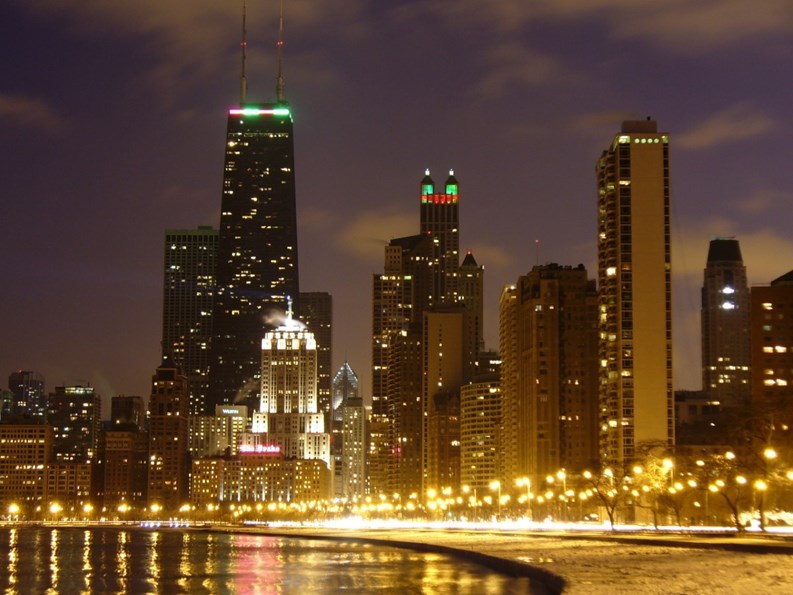Having the same cachet as Manhattan’s Upper East Side, Chicago’s Gold Coast is as affluent as its name suggests: it is the wealthiest residential neighborhood in the Windy City.
The landmarked neighborhood for the super-rich got its start back in 1882 (shortly after the great Chicago Fire) when State Street dry goods merchant and hotelier Potter Palmer and his wife Bertha, built a fairytale-like castle on a block at 1350 North Lake Shore Drive.
Catering to High Society
Architects Henry Ives Cobb and Charles Frost designed the castle, which was completed around 1887, at a cost totaling more than $1 million dollars. The 42-room mansion featured a three-story Italianate central hall while other rooms were furnished in many historic styles: a Louis XVI salon, an Indian room, an Ottoman parlor, a Renaissance library, a Spanish music room, an English dining room that could seat fifty, and a Moorish room with perfume-scented rugs. Paintings, collected by Bertha Palmer, graced the mansion's grand 75-foot-long ballroom, and its exterior was adorned by dozens of turrets and minarets reminiscent of a Bavarian castle. Kings, presidents and the finest in high society were entertained there in its heyday.
Over the next few decades, Chicago's elite gradually migrated from South Prairie Avenue to new homes north of the Loop. Today, the neighborhood is a mixture of mansions, row houses, and high-rise apartments. The Palmer Mansion was demolished in 1950 to build a block of apartment buildings but some of the other mansions and townhouses remain (including the historic Charnley-Persky House). The district was added to the National Register of Historic Places in 1978.
The Gold Coast features many high-rise apartment buildings on Lake Shore Drive, facing Lake Michigan, and mostly low rise residences inland. As with many neighborhoods, its exact borders tend to be disputed but, generally they extend from North Avenue, south, to Division Street and west to Clark Street; and, it also includes the areas east of State Street, south, to Oak Street and east of Michigan Avenue, south, to Walton Place. According to the latest data from the Chicago Association of Realtors, the average home price in the area ranges from about $680,000 to around $2 million.
Don’t Throw Stones Here
An iconic pair of glass-and-steel apartment towers at 860-880 Lake Shore Drive along Lake Michigan received city landmark status in June 1996 and were added to the National Register of Historic Places on August 28, 1980. Designed by famous architect Ludwig Mies van der Rohe, the 26 floor, 254-foot-tall towers are called the "Glass House" apartments. The design principles used here were copied so extensively they are now considered characteristic of the modern International style of high-tech architecture.
Not loved at the time they were built, the towers went on to become the prototype for steel and glass skyscrapers worldwide. The 860-880 Lake Shore Drive Apartments embody the spirit of Modernist architecture with their verticality, steel grids, glass curtain walls, and lack of ornamentation. Mies, a master of minimalist composition, believed “less is more” and demonstrated it in his self-proclaimed “skin and bones” architecture.
The Magnificent Mile
And the Gold Coast is home to one of the most famous shopping areas in the world. The Magnificent Mile (predominantly centered around Michigan Avenue) contains a mixture of upscale department stores, restaurants, luxury retailers, residential and commercial buildings, financial services companies and hotels, and caters primarily to tourists and the affluent. The area also has a high concentration of the city's major media firms, such as the Chicago Tribune newspaper, PR firms and advertising agencies. The Magnificent Mile includes 3,100,000 square feet of retail space, 460 stores, 275 restaurants, 51 hotels, and a host of sightseeing and entertainment attractions that draw in more than 22 million visitors annually.
Five of the 85 tallest buildings in the world are located here and in fact, five of the ten tallest buildings in Chicago, seven of the top 18, and nine of the top 50 are located within a few blocks of this district.
Major attractions in the district include the Navy Pier, which contains an amusement park and convention center, the John Hancock Building, and the Old Water Tower. The John Hancock building, which stands 100 stories tall and is a dominant part of Chicago’s skyline, is instantly recognizable by locals and non-locals alike. The building contains offices, condominiums and restaurants; the 95th floor houses The Signature Room, an upscale restaurant that offers city views as well as Lake Michigan. There is an observation deck on the 94th floor as well. The Chicago Water Tower (one of only two structures to survive during the 1871 fire) is the second-oldest water tower in the United States, after the Louisville Water Tower in Louisville, Kentucky.
Many fine restaurants also can be found in the area, primarily in the vicinity of Michigan Avenue, State and Rush streets. Morton’s the Steakhouse, Carmine’s, NoMi, Gibsons Bar, Mike Ditka’s and Tavern on Rush are among the Zagat’s rated culinary establishments.







Comments
Leave a Comment